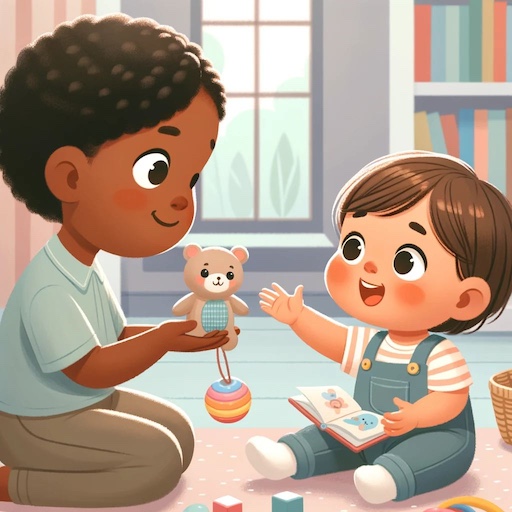Important Milestones For Your Child By Eighteen Months
Introduction
By 18 months, children exhibit significant milestones that offer insights into their social, emotional, cognitive, and physical development. This phase marks a period of exploration, independence, and the beginnings of expressive language. Utilizing tools like the CDC’s Milestone Tracker can help parents and caregivers monitor these developments, ensuring that children are on track and identifying any areas where they may need support. Observing these milestones closely helps in fostering an environment that nurtures curiosity, strengthens bonding, and supports overall growth.

Key Milestones for 18-Month-Old Children
By 18 months, children display significant progress in their developmental journey, showcasing newfound independence, communication attempts, and physical coordination. These are the milestones typically observed in children at this vibrant stage:
Social/Emotional Milestones
- Begins to seek independence but checks in for your proximity, showing an awareness of and need for security.
- Points to share experiences or interests, indicating a desire for social connection and communication.
- Extends hands for assistance in tasks like washing, demonstrating cooperation and participation.
- Engages with books, looking at pictures with you, reflecting early literacy interest.
- Shows affection freely, giving hugs and kisses, which enhances emotional bonding.
Language/Communication Milestones
- Attempts to articulate more than a couple of words beyond "mama" or "dada," showing expanding vocabulary.
- Identifies familiar items when named, linking words to objects for improved communication.
- Follows simple spoken instructions without gestures, highlighting developing auditory processing.
- Points to express needs or seek help, using nonverbal signals for communication.
Cognitive Milestones
- Mimics everyday activities, like pretending to sweep, which shows observational learning and role-playing.
- Engages in simple play with toys, such as pushing a car, indicating exploratory behavior and imagination.
Movement/Physical Development Milestones
- Walks unassisted, marking a major milestone in independent mobility.
- Starts to scribble spontaneously, showing creativity and fine motor skill development.
- Manages to drink from a cup and may start using utensils, indicating growing self-feeding skills.
- Climbs onto furniture without help, demonstrating increased physical ability and confidence.

Diving Deeper: Unveiling Your 18-Month-Old's Development
Social/Emotional Growth
By 18 months, children demonstrate increased independence, venturing slightly away while ensuring their caregiver is nearby. This behavior indicates their growing confidence balanced with a need for security. Sharing discoveries, like pointing at birds or airplanes, showcases their desire to connect and communicate with others. Participating in cooperative tasks, such as washing hands together, and showing affection openly are pivotal in deepening social and emotional bonds.
Language and Communication Evolution
Expanding their verbal repertoire, 18-month-olds try to say multiple words to express their needs or name objects, stepping beyond simple "mama" and "dada." Their ability to understand named objects and follow verbal instructions without gestures marks a significant leap in comprehension and communication skills. Pointing to communicate desires or seek help illustrates their reliance on non-verbal cues to interact with their world effectively.
Cognitive Development Insights
Imitating household chores represents a blend of observation and role-playing, highlighting cognitive growth and the understanding of social roles. Engaging with toys in a purposeful manner, like pushing a car, suggests an expanding imagination and the application of cause and effect. These cognitive milestones underline an evolving sense of the world and their place within it.
Advancements in Movement and Physical Abilities
Achieving independent walking is a landmark development at 18 months, showcasing their physical agility and exploration drive. Scribbling, although seemingly random, indicates creativity and motor skill development. Progress in self-feeding, such as using fingers adeptly and experimenting with a spoon, along with the newfound ability to climb onto furniture unassisted, heralds a phase of increased autonomy and motor skill refinement.
When You Have Concerns About Your Child's Development
While tracking developmental milestones provides valuable insights into your baby's growth, it's crucial to remember that these milestones are not set in stone. Most children (about 75%) reach these milestones by a certain age, but many healthy and happy babies develop at their own unique pace. Some may achieve certain skills more quickly, while others take a bit longer, and that's perfectly normal.
As the person who knows your baby best, your observations are invaluable. When speaking with your child’s doctor, consider discussing:
- Activities and routines you and your baby enjoy together.
- Your baby's favorite ways to play and interact.
- Any behaviors or skills that seem unusual or concerning to you.
- If your baby seems to have lost any skills they once had.
- Any special healthcare needs your baby might have, including if they were born prematurely.
It’s always better to address any concerns early. If you're worried about your baby's development or if they're not meeting the milestones as expected, don't hesitate to talk to your pediatrician. They can provide guidance, support, and, if necessary, further evaluation to ensure your baby gets the best start possible. Remember, you're doing a great job, and seeking advice or clarification is part of ensuring the well-being of your precious little one.
Empowering Your 18-Month-Old's Growth: Essential Parenting Tips
As your toddler reaches 18 months, their world is expanding. Encouraging their development while ensuring their safety becomes crucial. Here are some strategies recommended by the CDC to support your child's growth at this vibrant stage of life:
- Encourage Positive Behaviors: Use positive words and actions to encourage behaviors you want to see more of. For instance, praise your child for sharing or playing nicely. This reinforces desired behaviors and supports their social and emotional development.
- Promote Imaginative Play: Pretend play is a significant aspect of cognitive development at this age. Provide opportunities for your child to engage in creative play, such as pretending to feed a doll or driving a toy car, to enhance imagination and problem-solving skills.
- Support Language Development: Expand on your child's attempts at speech by repeating and building on their words. If they say "ba" for ball, you can respond with, "Yes, that's a ball! It's round and bounces." This encourages language skills and helps them learn new words.
- Teach About Emotions: Help your child understand and express their feelings in positive ways. Acknowledge their emotions and guide them on how to react. For example, if they feel frustrated, teach them words to express their feelings and appropriate ways to calm down.
- Involve in Everyday Activities: Let your child participate in simple household chores. This can include putting toys away, helping to wipe spills, or carrying small items. These activities enhance their sense of responsibility and belonging.
- Foster Independence: Encourage self-feeding with utensils and drinking from a cup without a lid. Although messy, these activities are crucial for their fine motor development and independence.
Remember, every child develops at their own pace. Stay observant of your child's unique needs and milestones. Don't hesitate to reach out to healthcare professionals for guidance, ensuring your child receives the support they need for healthy growth and development.

Summary and Resources
Reaching 18 months marks a period of remarkable growth and development in a child's life. This stage is filled with new discoveries, as children start to explore more independently, communicate with a growing vocabulary, and demonstrate early problem-solving skills. Witnessing these milestones provides joyous moments for families and underscores the importance of engaged support and interaction.
As caregivers, providing a safe and nurturing environment where our toddlers can thrive is essential. Encouraging their curiosity, guiding their first steps into independence, and celebrating their successes fosters a strong foundation for their ongoing development. Recognizing and supporting each child's unique pace of development is key to building their confidence and skills.
To aid parents and caregivers in this journey, the CDC offers the Milestone Tracker app. This resource is invaluable for monitoring progress, understanding developmental expectations, and accessing strategies to support each stage of growth. The app is designed to provide reassurance and practical advice, ensuring caregivers have the tools they need to support their child’s development effectively.
For further information on nurturing your child’s development and accessing a comprehensive suite of resources, visit the CDC Milestone Tracker page. By leveraging these tools, we can all contribute to a supportive and enriching developmental experience for every child.
